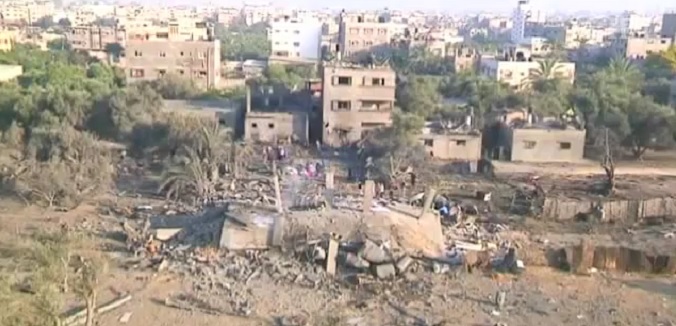The Israel Defense Forces announced late Monday that it had launched Operation Protective Edge against Gaza-based Palestinian military infrastructure, a day after at least 80 rockets slammed into Israel and after multiple Israeli efforts at deescalation – including a last-ditch gesture last Friday – had failed:
#IDF has commenced Operation Protective Edge in #Gaza against #Hamas, in order to stop the terror #Israel‘s citizens face on a daily basis
— IDF (@IDFSpokesperson) July 7, 2014
At least 220 projectiles had been launched by Gaza-based Palestinians in under a month, and Hamas had recently begun openly taking credit for the barrages.
Business Insider had assessed earlier in the day that Prime Minister Benjamin Netanyahu was seeking to avoid a broader conflict for a range of domestic and geopolitical reasons:
There is an apparent split between Netanyahu and his allies in the security cabinet, and right-wing coalition partners who want a more robust counter to the Gaza attacks. Earlier today, right wing politician and Israeli foreign minister Avigdor Lieberman pulled his Yisrael Beitanu faction out of Netanyahu’s Likud Party, supposedly over Netanyahu’s insufficient response to the rocket barrage. Others on the right worry that Netanyahu’s limited response is jeopardizing Israel’s deterrence.
Netanyahu’s restraint makes a certain intuitive sense. Hamas is a signatory to and indirect participant in a U.S.-funded Palestinian unity government. Iran and the western security alliance have resumed their negotiations over the Iranian nuclear program, and a potential Iranian bomb is an issue of far greater importance to Netanyahu than Hamas’s rocket fire. Hamas operates in plainclothes and launches rockets from civilian areas, all but ensuring that any major operation in Gaza will have civilian causalities — as well as accompanying political costs that Netanyahu doesn’t think Israel can afford at the moment.
The pace and amount of attacks nonetheless increased over the course of the day, at one point reportedly reaching 30 rockets per hour and penetrating deeper into Israel than at any point since Jerusalem concluded its November 2012 Operation Pillar of Defense.
Rail services across southern Israel had been suspended, as had summer camps, kindergartens and schools within 40 kilometers of the Gaza Strip.
Asked about the crisis in general at Monday’s daily State Department briefing – and more specifically, about Hamas’s declaration that barrages targeting Israeli civilians would continue until Jerusalem lifted security-related import and export restrictions on the Gaza Strip – State Department Spokesperson Jen Psaki tersely reasserted Israel’s right to self-defense:
QUESTION: Well, wait. Do you have any reaction to the – anything to say about the rockets? I mean, the Israelis say that this is really ramping up the tensions.
MS. PSAKI: Well, correct. As you know, I mean, anytime there are rocket attacks into Israel, we certainly condemn those and we would do so in this case as well. And there’s no place for violence and increasing tension as we’re seeing on the ground. We don’t feel that’s productive to a peaceful society.
QUESTION: Jen, the small cabinet, the security cabinet, just finished a meeting like an hour or so ago, and they decided to continue with their – with targeting targets in Gaza. Are you talking to anyone – like perhaps the Egyptians – to see if they could somehow broker a quieting period or a quiet-down period? Because it seems this thing is really escalating out of control, isn’t it?
MS. PSAKI: Well, Said, we – as I mentioned, we strongly condemn the continuing rocket fire into Israel, but we also support Israel’s right to defend itself against these attacks. I think the Secretary’s calls have also reiterated the need to reduce tensions and decrease violence, and that’s part of the discussion that we’re having with both parties at this time.
[Photo: IBTimes UK / YouTube]




